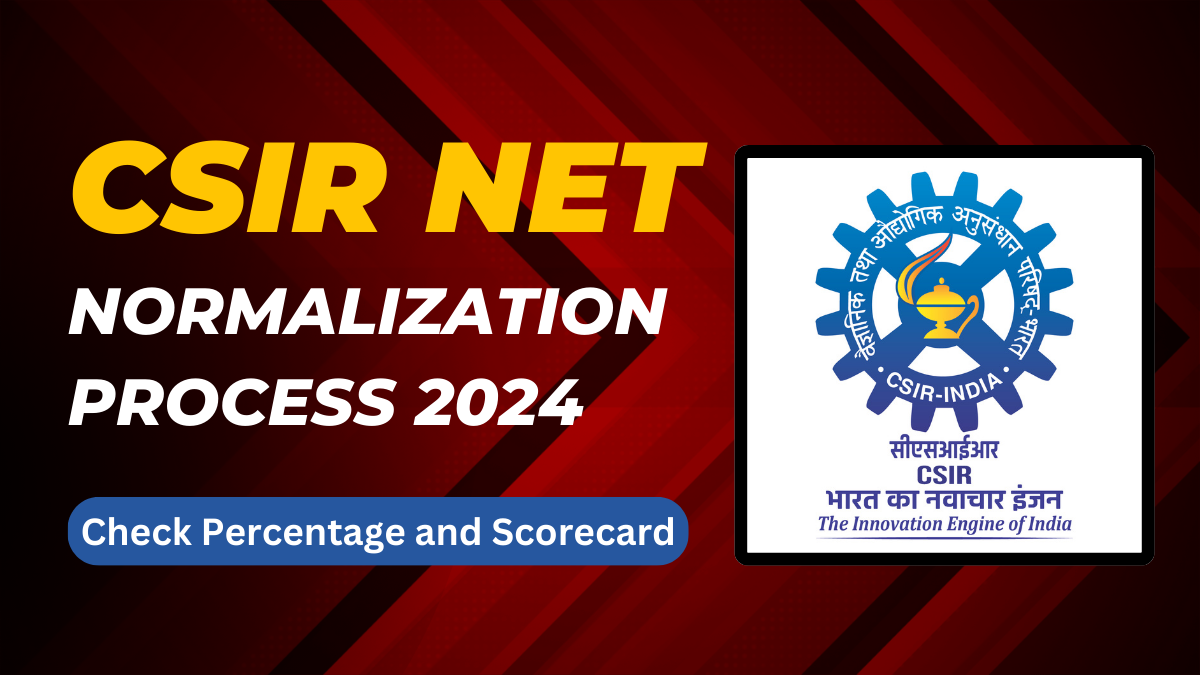Table of Contents
The Council of Scientific and Industrial Research (CSIR) has released the CSIR National Eligibility Test (NET) Result 2024 on official website. Out of the 2,25,335 candidates registered for the CSIR NET Exam, 1,63,529 candidates appeared for the examination.
With a large number of candidates appearing for this CSIR NET exam across different sessions, the National Testing Agency (NTA) implements a normalization process to ensure fairness in evaluation. This article will take a deep dive into the CSIR NET Normalization Process 2024, the percentile calculation, and how the scorecard is compiled.
What is the CSIR NET Normalization Process?
The CSIR NET 2024 exam is conducted in multiple shifts and sessions. The CSIR NET Exam subject-wise breakdown of candidates is as follows: 5,171 appeared for Earth Sciences, 25,075 for Physical Sciences, 29,118 for Mathematical Sciences, 34,638 for Life Sciences (Shift 1), 33,212 for Life Sciences (Shift 2), and 36,315 for Chemical Sciences. As the CSIR NET Life Sciences exam was conducted in multiple shifts, the CSIR NET Normalization Process 2024 ensures fair scoring across different sessions.
NET Normalization ensures that the marks of candidates who might have attempted a tougher question set are fairly balanced with those who received an easier one. The final outcome is a normalized score that accurately reflects a candidate’s performance relative to others.
Why Does the CSIR NET Need a Normalization Process?
The CSIR NET normalization process is critical in multi-shift because it guarantees that candidates are neither advantaged nor disadvantaged based on the difficulty level of the question paper they attempted. Here are the key reasons:
- Variability in Difficulty Levels: Despite efforts to maintain uniform difficulty across shifts, slight variations are inevitable. Normalization ensures that a tougher shift doesn’t penalize its candidates.
- Fair Ranking: Since CSIR NET is a competitive exam, where even a fraction of a score can impact a candidate’s rank, normalization is essential to ensure that scores are fair and comparable across shifts.
- Transparency: NTA’s commitment to transparency is upheld by using normalization. It provides candidates with confidence that their performance is being evaluated on a level playing field.
CSIR NET Normalization Score 2024
CSIR NET Normalization Score 2024 is the adjusted score derived after applying the normalization process to the raw marks obtained by candidates in their respective shifts. In the CSIR NET 2024, the normalization process converts raw scores into a standardized format known as the NTA score or percentile score. This ensures consistency in results, regardless of which shift a candidate appeared in.
How is the CSIR NET Normalization Score Different from NET Raw Marks?
CSIR NET Raw marks are the actual marks obtained by a candidate based on their performance in the exam. In contrast, the NET normalization score is calculated by adjusting the raw marks according to the overall performance of candidates in other shifts. This adjustment takes into account the difficulty level of each shift, ensuring that candidates are evaluated on a common scale.
For example, if a candidate scores 120 out of 200 in a comparatively tougher shift, their normalized score may be higher when compared to someone who scored 125 in an easier shift. The final normalized score reflects the candidate’s performance relative to others across different sessions.
Steps for CSIR NET Normalization Process 2024
The CSIR NET normalization process 2024 adopted by NTA involves several carefully designed steps:
Step 1: Distribution of Candidates Across Sessions
Candidates are distributed into different shifts or sessions randomly to ensure that there is no bias in the allocation of candidates. Typically, the sessions are:
- Session 1: Morning shift
- Session 2: Afternoon shift
This randomized distribution ensures that the mix of candidates in each session is diverse and representative of the overall pool.
Step 2: Calculation of Raw Scores
Once the exam is completed, the raw scores of candidates are calculated based on the number of correct and incorrect answers. The raw score is simply the total marks a candidate obtains without any adjustment for the difficulty level.
Step 3: Calculation of Percentile Scores
Next, the raw scores are converted into percentile scores. Percentile scores represent the percentage of candidates who have scored equal to or below a particular score in the exam. It’s a way to rank candidates relative to others in the same session.
Here’s how percentile scores are calculated:

This formula helps establish a candidate’s position relative to others in their session. The percentile scores are calculated up to seven decimal places to avoid ties and ensure precision in ranking.
Step 4: Merging Percentile Scores Across Sessions
Once percentile scores are calculated for each session, they are merged across different shifts. This is done to ensure a uniform scale across all shifts. The final NTA score is generated based on these merged percentile scores.
Step 5: Determining Eligibility Cut-Offs
In case the percentiles vary across sessions, the lowest percentile is taken as the eligibility cut-off for that category. For instance, if a 40% raw score corresponds to a percentile score of 78 in Shift 1 and 79 in Shift 2, the eligibility cut-off for the General Category will be set at the lower of the two percentiles (i.e., 78). This ensures fairness in determining who qualifies.
CSIR NET Percentile Score 2024
The CSIR NET Percentile Score 2024 represents the percentage of candidates who scored equal to or below a specific score in a given session. Percentile scores range from 0 to 100, with 100 being the highest percentile, representing the top scorer in that session. For example, if a candidate’s percentile score is 95, it means that they performed better than 95% of the candidates in that session.
CSIR NET Scorecard 2024
The CSIR NET Scorecard is an official document that reflects a candidate’s performance in the CSIR NET exam. It includes key details such as the candidate’s name, roll number, subject, category, section-wise marks, total marks, percentage, and percentile score. Additionally, it indicates the qualification status for Junior Research Fellowship (JRF) or Lectureship/Assistant Professorship. CSIR NET scorecard is important for candidates to verify their results and determine eligibility for further academic or professional opportunities. It can be downloaded from the NET official website by entering the required credentials.




 CSIR NET City Intimation Slip 2025 Out a...
CSIR NET City Intimation Slip 2025 Out a...
 UP LT Grade Teacher Answer Key 2025 Out,...
UP LT Grade Teacher Answer Key 2025 Out,...
 KVS Recruitment 2025 OUT, Check Eligibil...
KVS Recruitment 2025 OUT, Check Eligibil...












